SIS student gains valuable experience at ARSL conference
Wayne State University School of Information Sciences (SIS) Assistant Professor Christine D’Arpa, along with colleagues from the University of Oklahoma and the University of North Carolina-Greensboro received a three-year, $475,782 grant from the Institute of Museum and Library Services (IMLS) in 2019. The funds have supported the team’s research on health and wellness programming at small and rural public libraries in Michigan, Vermont, Oklahoma and North Carolina, with the goal of learning how those institutions address health and wellness through public programs.
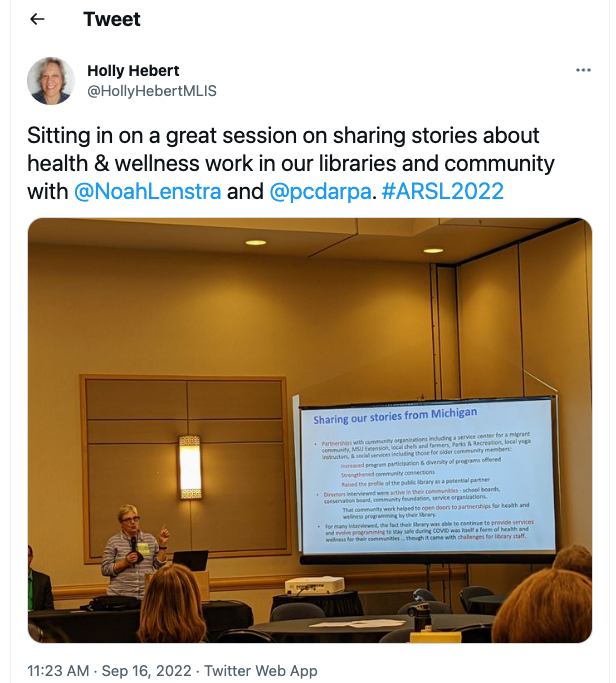
One of the aspects of the IMLS grant is to create opportunities for the team’s research assistants – masters students in library and information science programs. SIS student Andrew Wilhelme has worked with D’Arpa on the grant-funded research and was invited to attend the Association for Rural and Small Libraries (ARSL) 2022 Conference. Wilhelme, along with D’Arpa, co-investigator Noah Lenstra, associate professor of library and information science at the University of North Carolina at Greensboro, and Suzanne Moore, county librarian for Wilkes County, North Carolina, presented findings from their research in a session entitled Sharing Our Stories to Support Health & Wellness at Work and in Our Communities.
“ARSL is a creative and vibrant community of library workers. Andrew not only contributed to our session, but made professional connections and represented SIS and Wayne State at the conference,” said D’Arpa.
Read about Wilhelme’s experiences in his own words below.
Gleanings from the Association for Rural and Small Libraries Conference
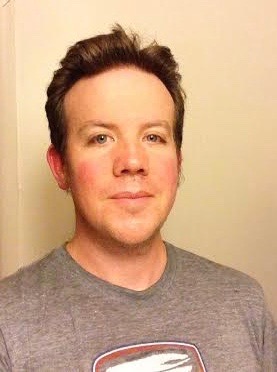
September 14-17, 2022
by Andrew Wilhelme
This past September I had the unique opportunity to attend the annual Association of Rural and Small Libraries (ARSL) conference in Chattanooga, Tennesee. The ARSL Conference is national in scope, drawing librarians and other information professionals from throughout the United States. I was invited to participate by Professor Christine D’Arpa who I am helping as a research assistant working on an IMLS grant funded study of health and wellness programs in small and rural libraries in Michigan. D’Arpa and her colleague, Noah Lenstra, updated the rural and small library community on findings from their IMLS funded research project, Community Health and Wellness: Small and Rural Library Practices, Perspectives, and Programs.
Attending the conference offered me a chance to observe and learn about the information profession through a different lens than the ones provided by online classes, and I am grateful for that chance. I’d always believed librarians to be a friendly bunch, but my expectations were far exceeded by those that I met and chatted with. They were all eager to hear about my studies and plans upon graduation and were happy to give me advice. Such a welcoming atmosphere was truly heartening.
Discovering resources
Like similar gatherings, organizers of ARSL conferences try to highlight distinctive features of their host location. One of the prominent places organizers chose to bring attention to was the Chattanooga Public Library’s maker space, which takes up the entirety of the building’s fourth floor. It was here that attendees gathered for the opening reception. Though I’ve been to privately run maker spaces before, this one was my first at a public library. Suffice to say that I was impressed. They seemed to have it all: a button maker, a variety of printers, a floor loom, sewing machines, virtual reality equipment and much more.
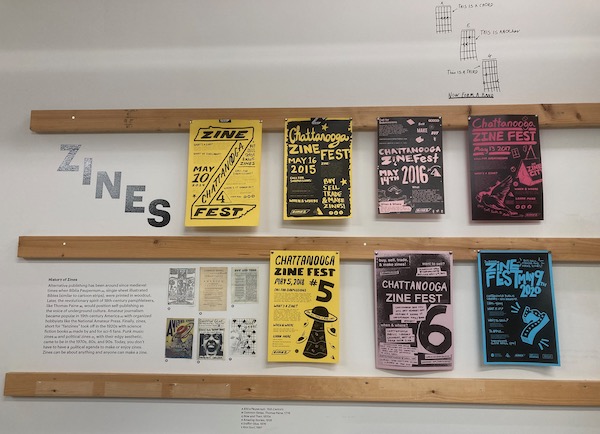
My favorite resource was the Chattanooga Zine Library and zine-making lab. Zines are self-published DIY magazines created for small audiences sharing unique interests. I remember friends creating and distributing zines in my younger days so seeing all sorts of varieties in a collection and a space dedicated to helping folks produce them brought on a wave of nostalgia and amazement. The Zine Library and lab was created in 2014 through a collaboration between the Chattanooga Public Library and a professor of graphic design at the University of Tennessee at Chattanooga. The library partners with art students from UTC to host the annual Chattanooga Zine Fest where folks from around the world come to share their work and celebrate zines!
Valuable sessions
A broad range of interesting sessions packed the conference agenda. Since health and wellness was my primary focus, I decided to concentrate on sessions that touched upon these themes. Luckily, finding such sessions was not a challenge. Fresh Approaches: Food Security and Public Libraries presented by Noah Lenstra, associate professor of library and information science at the University of North Carolina Greensboro, and Katie Sullivan, program manager with the Urban Libraries Council, proved to pair well with my interest in the role of libraries in promoting community health.
The session began with an introduction to the problem of food insecurity. I learned our country’s rural populations are disproportionately affected by food insecurity; a fact that surprised me given my association of the word rural with agriculture. A new term for me, food swamp, helped explain issues of rural food insecurity. While I am familiar with the concept of a food desert, which speaks to issues of access to food generally, I was not acquainted with a food swamp which more specifically denotes difficulties in obtaining healthy foods. Unfortunately, many folks living in rural America, though they have access to food, live in food swamps due to a lack of nutritious options. The speakers presented case studies from around the United States in which libraries created programs, often in partnership with other organizations, to help address food insecurity in their communities. These included hosting community gardens and farmers markets, creating seed libraries, providing spaces for CSA pick-ups, and partnering with food banks, university extension offices, local farmers and civic organizations to promote and help facilitate access to existing resources, provide educational programming and perform outreach in their community. The session’s audience was very receptive, and many shared their own experiences fighting food insecurity in the communities served by their libraries in the discussion that followed.
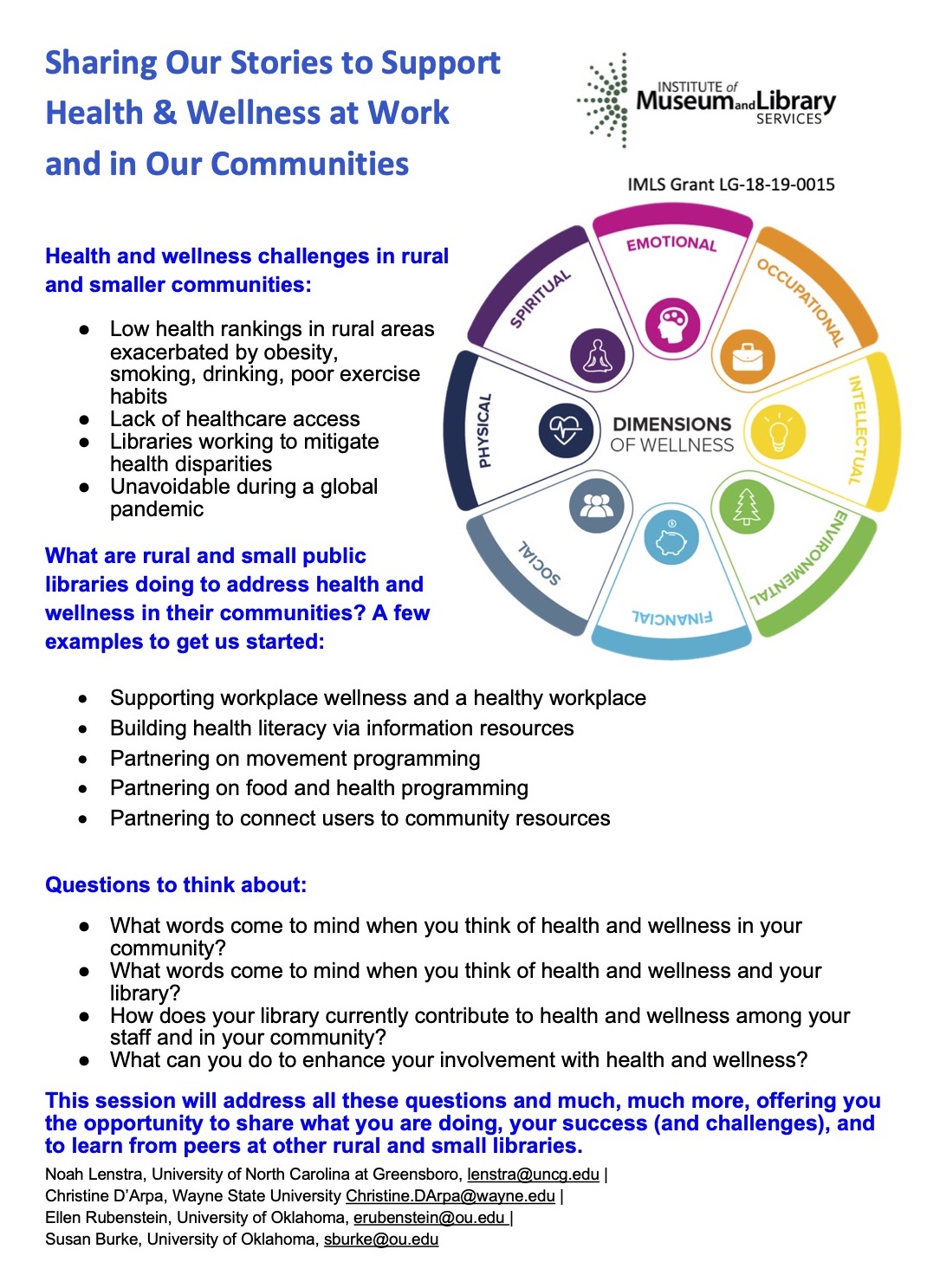 Presenting opportunity
Presenting opportunity
The following day I had the opportunity to participate in our session, Sharing Our Stories to Support Health & Wellness at Work and in Our Communities, featuring Professor D’Arpa and Professor Lenstra, who presented findings from the four states in our IMLS-funded study: Michigan, North Carolina, Oklahoma and Vermont. Suzanne Moore, county librarian for Wilkes County, North Carolina, joined us to share details of health and programming in her public library and talk about the Wellness Wheel (see our session handout). We wanted to spend most of the session hearing from the audience so after a brief presentation we opened the floor and invited participants to share their experiences hosting, partnering and providing health and wellness programming in their own libraries. While some described programs similar to the ones we’d found in our research – story walks, yoga instruction, cooking classes, exercise and nutrition classes focused on seniors and more – there were many stories whose activities and themes I had not come across.
A focus on wellness
One that caught my attention was from a director of library services in North Bend, Oregon, who focused her energy on library staff first, believing that if they were not of sound body and mind, how could they help their patrons? Staff “happy hours” are a creative benefit she developed that encourages employees to take extended breaks from their tasks and do self-care activities like taking a walk or reading a book. She also tries to strike a balance between difficult, stressful tasks and those that are relaxing and easy. For instance, a recent NARCAN training session was followed up with laughter yoga. Another participant from Sonoma County, California, told us about enlisting the help from staff at the local department of public health to develop a Health and Wellness collection at her library. This partnership focused on the needs of the department’s clientele. The library also built a display of mental health resources in a prominent location to help destigmatize the subject. During the conversation that ensued this participant reiterated the importance of collaborating with community organizations to improve collections. This made a lot of sense to me. Libraries, especially small and rural ones, are stretched for resources and adequate staffing. Partnering with local experts, whether they are nutritionists, mental health advocates, fitness instructors, or social workers, to develop collections or offer activities and programming, is an effective way to mobilize the wisdom of the collective, working together to add more value to their community than the sum of what they could each create on their own. In all this was a productive session and will help supplement the research we’ve already done.
A whirlwind experience
Attending the ARSL 2022 Conference was a whirlwind adventure of travel, networking, learning more about library work and discovering a new city. It was my inaugural library conference and it proved to be a great setting to get my feet wet at a gathering of people doing amazing work in and with their communities. Though session speakers focused their attention on small and rural libraries, the issues they addressed – book challenges, outreach and marketing, equity, health and wellness and literacy, to name just a few – are by no means exclusive to this division of public libraries, or of information institutions as a whole. Having a chance to get outside the classroom setting and learn about our profession from librarians working on the front lines was an invaluable experience, one that I will pull from as I move forward with my education and career.
Learn more about IMLS
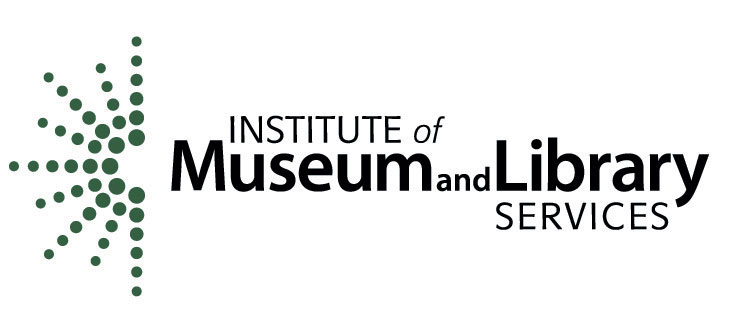 The Institute of Museum and Library Services is the primary source of federal support for the nation's libraries and museums. Its mission is to advance, support, and empower America’s museums, libraries, and related organizations through grantmaking, research, and policy development. The organization’s vision is a nation where museums and libraries work together to transform the lives of individuals and communities. To learn more, visit www.imls.gov.
The Institute of Museum and Library Services is the primary source of federal support for the nation's libraries and museums. Its mission is to advance, support, and empower America’s museums, libraries, and related organizations through grantmaking, research, and policy development. The organization’s vision is a nation where museums and libraries work together to transform the lives of individuals and communities. To learn more, visit www.imls.gov.